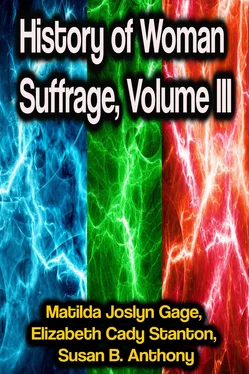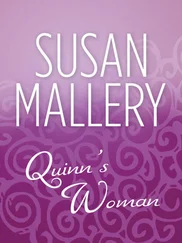Great unanimity was reached in these sentiments and the enthusiasm manifested gave promise of earnest labor and more hopeful results. It was felt that there was reason to thank God and take courage.
The day before the opening of the Tenth Washington Convention a caucus was held in the ladies' reception-room[23] in the Senate wing of the capitol. A roll-call of the delegates developed the fact that every State in the Union would be represented by women now here and en route, or by letter. Mrs. Spencer said she had made a request in the proper quarter, that the delegates should be allowed to go on the floor when the Senate was actually in session, and present their case to the senators. She had been met with the statement that such a proceeding was without precedent. Mrs. Hooker suggested that inasmuch as there was a precedent for such a course in the House, the delegates should meet the following Thursday to canvass for votes in the House of Representatives. Another delegate recalled the fact that Mrs. General Sherman and Mrs. Admiral Dahlgren had been admitted upon the floor of the Senate while it was in session, to canvass for votes against woman suffrage.
This agitation resulted in a resolution introduced by Hon. A. A. Sargent, January 10:
Whereas, Thousands of women of the United States have petitioned congress for an amendment to the constitution allowing women the right of suffrage; and whereas, many of the representative women of the country favoring such amendment are present in the city and have requested to be heard before the Senate in advocacy of said amendment,
Resolved , That at a session of the Senate, to be held on ——, said representative women, or such of them as may be designated for that purpose, may be heard before the Senate; but for one hour only.
Mr. Edmunds demanded the regular order.
Mr. Sargent advocated the resolution, and urged immediate action, as delay would detain the women in the city at considerable expense to them. He thought the question not so intricate that senators require time for consideration whether or not the women should be heard.
Mr. Edmunds said there was a rule of long standing that forbids any person appearing before the Senate. There was much to be said in favor of the petitions, but it was against the logic of the resolution that the petitioners required more than was accorded any others. He, therefore, insisted on his demand for the regular order.
Mr. Sargent gave notice that he would call up his resolution to-morrow, and reminded the senators that no rule was so sacred that it could not be set aside by unanimous consent.
On the next day there was a lively discussion, Senators Edmunds, Thurman and Conkling insisting there was no precedent; Mr. Sargent, assisted by Senators Burnside, Anthony and Dawes, reminding them of several occasions when the Senate had extended similar courtesies. The resolution was voted down—31 to 13.[24]
Hon. Wm. D. Kelly, of Pennsylvania, performed like service in the House:
Mr. Kelly asked leave to offer a resolution, reciting that petitions were about to be presented to the House of Representatives from citizens of thirty-five States of the Union, asking for the adoption of an amendment to the constitution to prohibit the disfranchisement of any citizen of any State; and that there be a session of the House on Saturday, January 12, at which time the advocates of the constitutional amendment may be heard at the bar. These petitions ask the House to originate a movement which it cannot consumate, but which it can only submit to the States for their action. The resolution only asks that the House will hear a limited number of the advocates of this amendment, who are now in the city, and on a day when there is not likely to be a session for business. They only ask the privilege of stating the grounds of their belief why the constitution should be amended in the direction they indicate. Many of these ladies who petition are tax-payers, and they believe their rights have been infringed upon.
Mr. Crittenden of Missouri, objected, and the resolution was not entertained.
This refusal to women pleading for their own freedom was the more noticeable, as not only had Mesdames Sherman and Dahlgren been heard upon the floor of the Senate in opposition, but the floor of the House was shortly after granted to Charles Stewart Parnell, M. P., that he might plead the cause of oppressed Ireland. The Washington Union of January 11, 1878, largely sustained by federal patronage, commented as follows:
To allow the advocates of woman suffrage to plead their cause on the floor of the Senate, as proposed yesterday by Mr. Sargent, would be a decided innovation upon the established usages of parliamentary bodies. If the privilege were granted in this case it would next be claimed by the friends and the enemies of the silver bill, by the supporters and opponents of resumption, by hard money men and soft money men, by protectionists and free-traders, by labor-reformers, prohibitionists and the Lord knows whom besides. In fact, the admission of the ladies to speak on the floor of the Senate would be the beginning of lively times in that body.
The convention was held in Lincoln Hall, January, 8, 9, 1878. The house was filled to overflowing at the first session. A large number of representative women occupied the platform.[25] In opening the meeting the president, Dr. Clemence Lozier, gave a résumé of the progress of the cause. Mrs. Stanton made an argument on "National Protection for National Citizens."[26] Mrs. Lockwood presented the following resolutions, which called out an amusing debate on the "man idea"—that he can best represent the home, the church, the State, the industries, etc., etc.:
Resolved , That the president of this convention appoint a committee to select three intelligent women who shall be paid commissioners to the Paris exposition; and also six other women who shall be volunteer commissioners to said exposition to represent the industries of American women.
Resolved , That to further this object the committee be instructed to confer with the President, the Secretary of State, and Commissioner McCormick.
A committee was appointed[27] and at once repaired to the white-house, where they were pleasantly received by President Hayes. After learning the object of their visit, the president named the different classes of industries for which no commissioners had been appointed, asked the ladies to nominate their candidates, and assured them he would favor a representation by women.
Miss Julia Smith of Glastonbury, Conn., the veteran defender of the maxim of our fathers, "no taxation without representation," narrated the experience of herself and her sister Abby with the tax-gatherers. They attended the town-meeting and protested against unjust taxation, but finally their cows went into the treasury to satisfy the tax-collector.
Elizabeth Boynton Harbert of the Chicago Inter-Ocean , spoke on the temperance work being done in Chicago, in connection with the advocacy of the sixteenth amendment.
Lillie Devereux Blake reviewed the work in New York in getting the bill through the legislature to appoint women on school boards, which was finally vetoed by Governor Robinson.
Dr. Mary Thompson of Oregon, and Mrs. Cromwell of Arkansas, gave interesting reports from their States, relating many laughable encounters with the opposition.
Robert Purvis of Philadelphia, read a letter from the suffragists of Pennsylvania, in which congratulations were extended to the convention.
Mary A. S. Carey, a worthy representative of the District of Columbia, the first colored woman that ever edited a newspaper in the United States, and who had been a worker in the cause for twenty years, expressed her views on the question, and said the colored women would support whatever party would allow them their rights, be it Republican or Democratic.
Читать дальше












